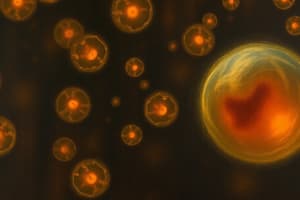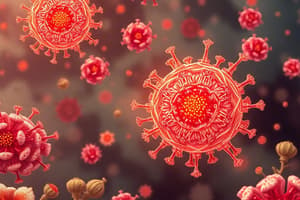Podcast
Questions and Answers
What is the primary function of lymph node macrophages in the context of antigen presentation?
What is the primary function of lymph node macrophages in the context of antigen presentation?
- To activate T-cells that have encountered their specific antigen
- To produce antibodies against antigens
- To engulf and process very large antigens, including viruses (correct)
- To present soluble antigens to B-cells
Which of the following is NOT involved in the initial steps of B-cell activation?
Which of the following is NOT involved in the initial steps of B-cell activation?
- Release of cytokines by the activated B-cell (correct)
- Presentation of processed antigen via MHC II
- Binding of antigen to IgD on the B-cell surface
- Engulfment of antigen by the B-cell
If a T-cell fails to detect its specific antigen within a lymph node, what is its likely next step?
If a T-cell fails to detect its specific antigen within a lymph node, what is its likely next step?
- It remains in the lymph node and waits for further activation signals
- It returns to the bloodstream and circulates to other lymph nodes (correct)
- It differentiates into a memory T-cell
- It undergoes apoptosis (programmed cell death)
What is the role of T helper (Th) cells in B-cell activation?
What is the role of T helper (Th) cells in B-cell activation?
What is the approximate timeframe required for a fully activated B-cell to differentiate into a plasma cell and begin antibody production?
What is the approximate timeframe required for a fully activated B-cell to differentiate into a plasma cell and begin antibody production?
What is the primary function of the five classes of antibodies (GAMED)?
What is the primary function of the five classes of antibodies (GAMED)?
Why is it important for a B-cell to find a T-cell with the correct TCR during activation?
Why is it important for a B-cell to find a T-cell with the correct TCR during activation?
Which of the following is a key difference between the activation pathways of T-cells and B-cells?
Which of the following is a key difference between the activation pathways of T-cells and B-cells?
Why is it important that a B-cell stays within the lymph node after detecting its specific antigen?
Why is it important that a B-cell stays within the lymph node after detecting its specific antigen?
What is the primary mechanism by which B-cells are sorted within the lymph node based on molecular size?
What is the primary mechanism by which B-cells are sorted within the lymph node based on molecular size?
Which of the following statements accurately describes the role of MHC II molecules in T-cell activation?
Which of the following statements accurately describes the role of MHC II molecules in T-cell activation?
In the context of T-cell activation, what is the primary function of perforin and granzyme?
In the context of T-cell activation, what is the primary function of perforin and granzyme?
Which of the following accurately describes the role of helper T cells (Th cells) in the immune response?
Which of the following accurately describes the role of helper T cells (Th cells) in the immune response?
What is the primary consequence of HIV targeting CD4+ cells?
What is the primary consequence of HIV targeting CD4+ cells?
Which of the following accurately describes the process of clonal expansion in T cells?
Which of the following accurately describes the process of clonal expansion in T cells?
How does the presentation of antigens on MHC I molecules differ from that of MHC II molecules?
How does the presentation of antigens on MHC I molecules differ from that of MHC II molecules?
Which of the following is NOT a direct consequence of helper T cell activation?
Which of the following is NOT a direct consequence of helper T cell activation?
What is the primary role of dendritic cells (DCs) in the immune response?
What is the primary role of dendritic cells (DCs) in the immune response?
What is the key difference between naive T cells and effector T cells?
What is the key difference between naive T cells and effector T cells?
Which of the following statements accurately describes the process of antigen presentation?
Which of the following statements accurately describes the process of antigen presentation?
Flashcards
T-cells
T-cells
White blood cells that mature in the thymus and respond to antigens.
T-cell Receptor (TCR)
T-cell Receptor (TCR)
Protein on T-cells that recognizes specific antigens on infected cells.
Cytotoxic T cells (CD8)
Cytotoxic T cells (CD8)
T-cells that kill cancerous or infected cells directly.
Helper T cells (CD4)
Helper T cells (CD4)
Signup and view all the flashcards
Major Histocompatibility Complex (MHC)
Major Histocompatibility Complex (MHC)
Signup and view all the flashcards
MHC I
MHC I
Signup and view all the flashcards
MHC II
MHC II
Signup and view all the flashcards
Clonal Expansion
Clonal Expansion
Signup and view all the flashcards
Antigen Presentation
Antigen Presentation
Signup and view all the flashcards
Importance of Helper T cells
Importance of Helper T cells
Signup and view all the flashcards
T-cell Activation
T-cell Activation
Signup and view all the flashcards
B-cell Function
B-cell Function
Signup and view all the flashcards
Lymph Node Sorting
Lymph Node Sorting
Signup and view all the flashcards
Lymph Node Macrophages
Lymph Node Macrophages
Signup and view all the flashcards
B-cell Activation Steps
B-cell Activation Steps
Signup and view all the flashcards
Clonal Selection
Clonal Selection
Signup and view all the flashcards
B-cell Process
B-cell Process
Signup and view all the flashcards
Th Cell Role
Th Cell Role
Signup and view all the flashcards
Plasma Cell Production
Plasma Cell Production
Signup and view all the flashcards
Antibody Classes
Antibody Classes
Signup and view all the flashcards
Study Notes
T-cell Activation
- Maturation: T-cells mature in the thymus.
- TCR: Each T-cell possesses a unique T-cell receptor (TCR) on its surface.
- Antigen Recognition: T-cells recognize antigens presented on the surface of infected cells.
- Specificity: T-cells target viruses and intracellular pathogens.
- Types:
- Cytotoxic T cells (CD8/Tc cells): Kill infected or cancerous cells.
- Helper T cells (CD4/Th cells): Activate the immune system via cytokines.
- Antigen Presentation via MHC: T-cells recognize antigens displayed on Major Histocompatibility Complex (MHC) molecules.
- MHC I: Found on all nucleated cells in the body. Presents intracellular foreign proteins.
- Mechanism: Foreign proteins are digested by proteasomes. Foreign peptides are delivered to MHC I. Cytotoxic T cells recognize this complex and kill the cell.
- MHC II: Found on dendritic cells and macrophages.
- Mechanism: Microbes are digested within phagosomes. Microbial peptides are loaded onto MHC II for presentation on the cell surface. Helper T cells recognize this complex and release cytokines to activate antigen-presenting cells (APCs).
- Antigen Presentation Summary:
- Infection occurs.
- Dendritic cells (DCs) present antigens to T-cells in lymph nodes.
- Activated T-cells are released.
- Cytotoxic T cells (Tc) kill infected cells.
- Helper T cells (Th) activate antigen-presenting cells (APCs).
- Memory T cells are produced.
Clonal Expansion of T-cells
- Activation: Activated by dendritic cells (DCs) – proliferation takes 1-2 days.
- Effector Cells: Activated effector cells (Th and Tc) leave lymphoid tissues.
- Th Cell Importance:
- Activate B-cells into plasma and memory cells.
- Stimulate Tc cell proliferation and killing.
- Activate macrophages.
- HIV Impact: HIV targets CD4 cells, impairing the immune system.
B-cell Activation
- Migration: Naive B-cells and T-cells migrate to lymph nodes and spleen.
- Circulation: Circulate throughout the body.
- Infection:
- Microbes enter the body.
- Antigens are presented in lymph nodes (by DCs) or in the blood (to spleen).
- T-cells and B-cells recognize antigens and become activated.
- Antigen Detection in Lymph Nodes:
- B-cells detect free antigens.
- Macrophages deal with larger antigens.
- Lymph fluid contains soluble antigens.
- T-cells identify antigen-presenting dendritic cells (DCs).
- If no antigen detected, T cells move to other nodes, otherwise Clonal selection occurs, Activating a clone.
- If soluble antigen detected: B-cell waits to be activated by Th cell.
- B-cell Activation Process:
- If antigen is detected, B-cells remain in lymph nodes.
- T-cells proliferate into Tc and Th cells.
- B-cell's IgD binds antigen, engulfs and processes it.
- The processed antigen is presented on MHC II.
- Within 48 hours, B-cell finds a Th cell with the correct matching TCR.
- B-cell activation leads to plasma cell production.
- Plasma Cell Production:
- Takes 4-7 days to produce 5000 plasma cells.
- Generates 5 classes of antibodies (GAMED).
Studying That Suits You
Use AI to generate personalized quizzes and flashcards to suit your learning preferences.
![Lecture 06: T-cells and B-cell activation [MCQ 1]](https://assets.quizgecko.com/cdn-cgi/image/width=800,height=300,fit=crop,quality=75,format=webp/quiz/d48abe08a72d88817373184f6d896c08.jpg)

![Lecture 06: T-Cell Activation and B cell Activation [SEQ 2]](https://assets.quizgecko.com/cdn-cgi/image/width=300,height=200,fit=crop,quality=75,format=webp/quiz/823e4a03caafa627290111b4012c4626.jpg)
